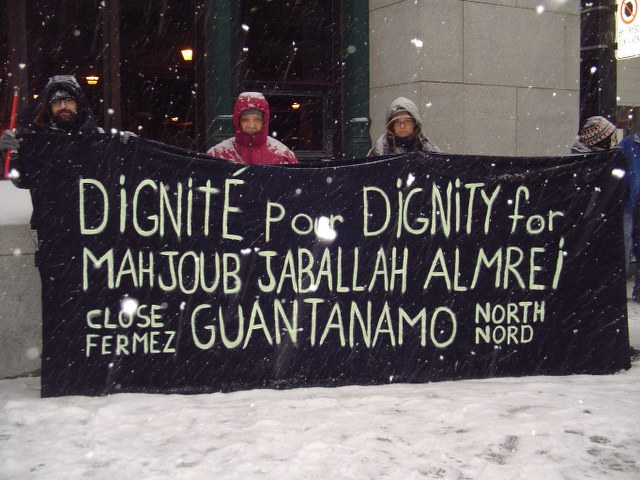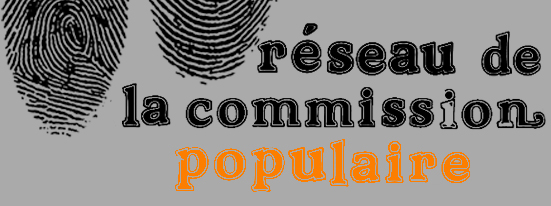Mohammed Zeki Mahjoub
Entrevue avec Mahjoub
Écoutez une entrevue d’Abousfian Abdelrazik !
Brief summary of Mr. Mahjoub's tribulations in Canada

Mohammad Zeki Mahjoub came to Canada in 1995 from Egypt, where he had been detained without charge and tortured. He was accepted as a refugee in 1996, settled in Toronto, got married, and had two young sons. However, back in Egypt, a year and a half after his arrival in Canada, his three brothers were arrested and held without charge for eight years. They were all released in 2005, never having been charged or tried.
In June 2000, Mr. Mahjoub was arrested on a security certificate. He began a hungerstrike in 2002, after he was sexually assaulted by a guard. His complaints led nowhere. This was the first of several hunger-strikes. In 2005, after being imprisoned for five years without a trial, Mr. Mahjoub began a hunger strike to protest prison conditions, consuming water, juice and occasional broth, lasting 76 days and losing 110lb before he was hospitalized.
In April 2006, Mr. Mahjoub, along with three other security certificate detainees, was transferred to the "Kingston Immigration Holding Centre", a six-cell facility opened specifically to detain Muslims held on security certificates, which was soon dubbed "Guantanamo North". The facility, which now stands empty, cost tax-payers $3.2 million to build, and two million a year to operate with one inmate, according to CBC.
Mr. Mahjoub, with two of the other detainees at Guatanamo North, went on hungerstrike again in winter of 2006 for 93 days. He was finally ordered transferred to house arrest on February 15th 2007.
It took months for Mr Mahjoub to be transferred from prison after the federal court ruling, and when he was, it was under conditions that in practice turned his home into a prison and his family into his prison guards.
In February 2007, the Supreme Court struck down Security Certificates as unconstitutional but gave the government a year to respond. Significantly, the court refused to accept that the regime was unfair since it only applied to refugees and permanent residents, and therefore afforded them a far lower standard than that accorded to Canadian citizens facing similar allegations.
In February 2008, Security Certificate laws expired but the Canadian government passed a new Security Certificate law which remained essentially the same. New certificates were issued against Mr. Mahjoub, Mahmoud Jaballah, Hassan Almrei, Mohamed Harkat and Adil Charkaoui. All five men remained in prison or under house arrest and had to begin the process all over again.
On 18 March 2009, Mr. Mahjoub returned to prison at Guantanamo North in Kingston. He could no longer subject his family to the intolerable and humiliating invasions of their privacy that the conditions of his house arrest required. On 01 June 2009, Mr. Mahjoub began another hunger strike to protest conditions in prison. He remained on hunger strike for six months.
On 30 November 2009, Mohammad Mahjoub, then the sole prisoner at “Guantanamo North”, was again ordered transferred to house arrest in Toronto.
In summer 2010, in a significant court victory, the Federal Court ruled that part of the "case" against Mr. Mahjoub was probably gleaned from torture, and could not be accepted by the Court. The extent of that finding, however, is still subject to closed door proceedings that Mr. Mahjoub cannot attend.
From about 1996 to 2006, CSIS and/or CBSA listened to, recorded, analysed and used Mr. Mahjoub's conversations with his lawyers against him. In December 2010, the Federal Court found that, despite a court order prohibiting this practice, CSIS continued to violate solicitor client privilege in this way for two more years.
In October 2011, the court reviewed Mr. Mahjoub's bail conditions, as it is required to do every six months. On February 03, 2012, the Federal Court ruled that the government failed to show that it is reasonable to maintain intrusive conditions of control and surveillance on Mohammad Mahjoub.
For the first time since 2000, Mr Mahjoub will be able to go anywhere in Toronto without supervision or notifying the CBSA; in addition, his curfew will be lifted and a camera in front of his house removed; and he will be able to travel anywhere in Canada. Many intrusive conditions nevertheless remain, such as a prohibition on use of internet and cell phone, phone tapping, and supervision outside Toronto. These conditions were imposed with sole reference to the government's arguments; the court ruled that it could not take Mr. Mahjoub's responses to the allegations into account.
Until the question of the commingled documents is decided, ongoing hearings on the certificate itself - unconstitutionality, illegality, "reasonability" - have been suspended. Depending on the outcome of the February hearings, these could continue in March with key witnesses like Stockwell Day.
Further background: Homes Not Bombs: Secret Trials

Le Réseau de la Commission populaire est un groupe de travail du GRIP-Concordia qpirgconcordia.org 514.848.7585 info@qpirgconcordia.org

Contactez le Réseau de la commission populaire: GRIP-Concordia - Réseau de la commission populaire c/o Université Concordia 1455 de Maisonneuve O Montréal, QC, H3G 1M8 commissionpopulaire@gmail.com
Ce site est basé sur le Fluid 960 Grid System




